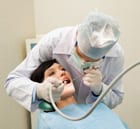 Your mouth is a sensitive organ which requires a great deal of care in order to ensure smooth functioning. The activities which you mouth are involved in include eating, drinking and talking and taking care of your mouth essentially means making sure that you are able to carry out those activities with comfort and ease. Sometimes though, dental treatments are required to correct problems in the mouth.
Your mouth is a sensitive organ which requires a great deal of care in order to ensure smooth functioning. The activities which you mouth are involved in include eating, drinking and talking and taking care of your mouth essentially means making sure that you are able to carry out those activities with comfort and ease. Sometimes though, dental treatments are required to correct problems in the mouth.
The treatments which dentists offer are many and varied. You might have lost a tooth or teeth and need to have them replaced with dentures or dental implants. Your dentist can also install crowns or veneers if you have a single lost tooth or a tooth that is cracked or damaged. Teeth whitening is also offered by dentists if you feel that you would like your teeth to be restored to a shiny whiteness.
Your dentist might need to carry out a procedure like root canal surgery if you have a problem with the pulp chamber inside one of your teeth. Gum disease can also be treated by dentists and sometimes dentists might need to perform a professional clean if plaque on your teeth has turned into tartar which cannot be removed by cleaning at home.
Modern dental treatments are mostly a lot swifter than they used to be with many surgeries now utilising the very latest in digital and computer technologies. Many procedures are far less painful than in the past too, thanks to pain free gels and improvements in technique.
Keep up the routine of visiting your Leeds dentist regularly so that your mouth can be monitored and any dental treatments can be carried out when they are required.





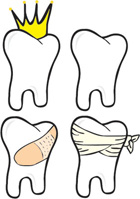 If you are experiencing a dental emergency you should get in touch with your City of Leeds dentist immediately. They are trained, dental experts and will be able to resolve whatever issue you have. It is much better to get a problem dealt with immediately so that it can be sorted out before things get any worse.
If you are experiencing a dental emergency you should get in touch with your City of Leeds dentist immediately. They are trained, dental experts and will be able to resolve whatever issue you have. It is much better to get a problem dealt with immediately so that it can be sorted out before things get any worse. You should make sure that you visit your dentist every six months to have your mouth checked by a professional, but the responsibility of looking after your teeth and gums does not only lie with your dentist. You ought to be taking good care of your teeth at home too, and making sure that you are cleaning them properly.
You should make sure that you visit your dentist every six months to have your mouth checked by a professional, but the responsibility of looking after your teeth and gums does not only lie with your dentist. You ought to be taking good care of your teeth at home too, and making sure that you are cleaning them properly. If you have an important social occasion coming up – a wedding for example – you might be concerned about the aesthetic state of your teeth. Over time teeth can become dull and stained; this is as natural as the fading of the colour of your hair. So many people spruce up the colour of their hair, why not give the same attention to your teeth?
If you have an important social occasion coming up – a wedding for example – you might be concerned about the aesthetic state of your teeth. Over time teeth can become dull and stained; this is as natural as the fading of the colour of your hair. So many people spruce up the colour of their hair, why not give the same attention to your teeth?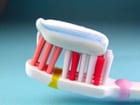 In taking care of your teeth you face many dilemmas such as the strength of the bristles you choose for your brush and whether you ought to use dental floss or dental tape. Another issue that many people wrestle with is that of fluoride and whether it is helpful to use it to aid in the fight against plaque.
In taking care of your teeth you face many dilemmas such as the strength of the bristles you choose for your brush and whether you ought to use dental floss or dental tape. Another issue that many people wrestle with is that of fluoride and whether it is helpful to use it to aid in the fight against plaque.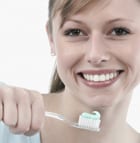 Brushing and flossing your teeth effectively and making sure you have a balanced diet are, of course, very important in ensuring lasting oral hygiene but you should combine this with regular visits to your dentist. Having your mouth checked by a professional is immensely helpful in making sure that your teeth and gums are healthy.
Brushing and flossing your teeth effectively and making sure you have a balanced diet are, of course, very important in ensuring lasting oral hygiene but you should combine this with regular visits to your dentist. Having your mouth checked by a professional is immensely helpful in making sure that your teeth and gums are healthy. Taking care of your mouth begins at home with a robust oral hygiene routine including regular brushing and flossing. But this must be pursued in tandem with visits to your dentist so that your mouth can be examined by a trained professional. The fact is that, no matter how vigilant you are, problems can develop with your teeth and gums that you may not spot. Unfortunately, going to see a dentist is no simple matter for the many people who have dental phobias.
Taking care of your mouth begins at home with a robust oral hygiene routine including regular brushing and flossing. But this must be pursued in tandem with visits to your dentist so that your mouth can be examined by a trained professional. The fact is that, no matter how vigilant you are, problems can develop with your teeth and gums that you may not spot. Unfortunately, going to see a dentist is no simple matter for the many people who have dental phobias.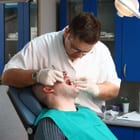 Bruxism is the activity of grinding your teeth during sleep. Although as common as snoring, bruxism can easily go unnoticed but it ought to be dealt with to avoid potentially serious complications with the teeth and jaw. Being sure to keep in regular contact with your dentist is a good way to guard against bruxism and its effects.
Bruxism is the activity of grinding your teeth during sleep. Although as common as snoring, bruxism can easily go unnoticed but it ought to be dealt with to avoid potentially serious complications with the teeth and jaw. Being sure to keep in regular contact with your dentist is a good way to guard against bruxism and its effects. We all know how important it is to take care of our teeth with effective brushing at home. By brushing twice a day you are stopping the build up of plaque which, if left unchecked, can cause cavities to form and dental decay to occur. But there are so many varieties of tooth paste on offer, it be confusing to know which one to choose.
We all know how important it is to take care of our teeth with effective brushing at home. By brushing twice a day you are stopping the build up of plaque which, if left unchecked, can cause cavities to form and dental decay to occur. But there are so many varieties of tooth paste on offer, it be confusing to know which one to choose. Having a baby is fraught with health issues as you try and ensure that the process of growing is not too painful for your infant. One of the issues that many parents face is that of teething. This is when your baby’s first proper set of teeth begin to come through.
Having a baby is fraught with health issues as you try and ensure that the process of growing is not too painful for your infant. One of the issues that many parents face is that of teething. This is when your baby’s first proper set of teeth begin to come through.

